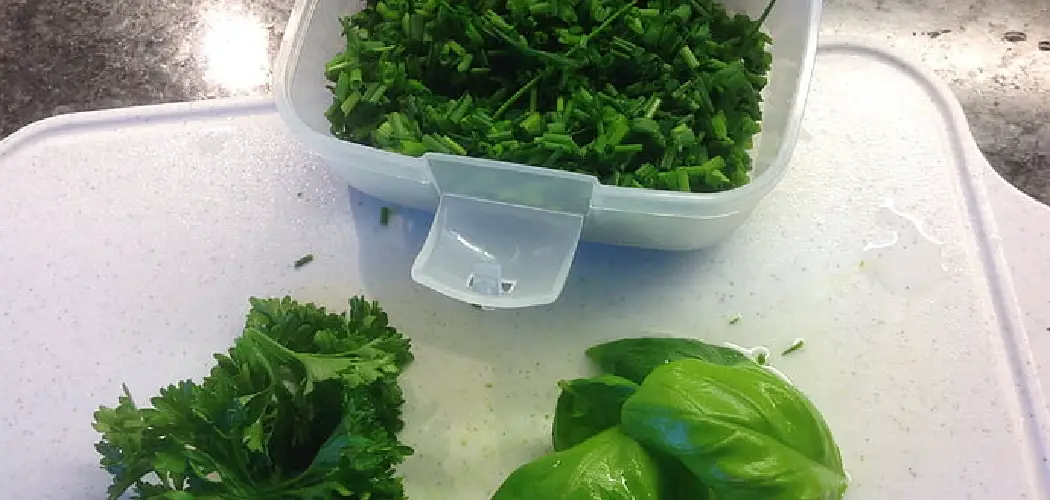Freezing parsley and basil is an excellent method to preserve these delicate herbs and ensure you have a year-round supply of their unique flavors. By taking this step, you’ll not only reduce food waste but also enhance the taste of your dishes even when these herbs are out of season.
Freezing does alter the texture of parsley and basil, yet it remarkably maintains their vibrant flavors, making them ideal for use in cooked dishes. Contrary to popular belief, these delicate herbs can withstand freezing, and their versatility remains unhampered.
So let’s explore how to freeze parsley and basil and make the most of these culinary jewels even in the off-season.
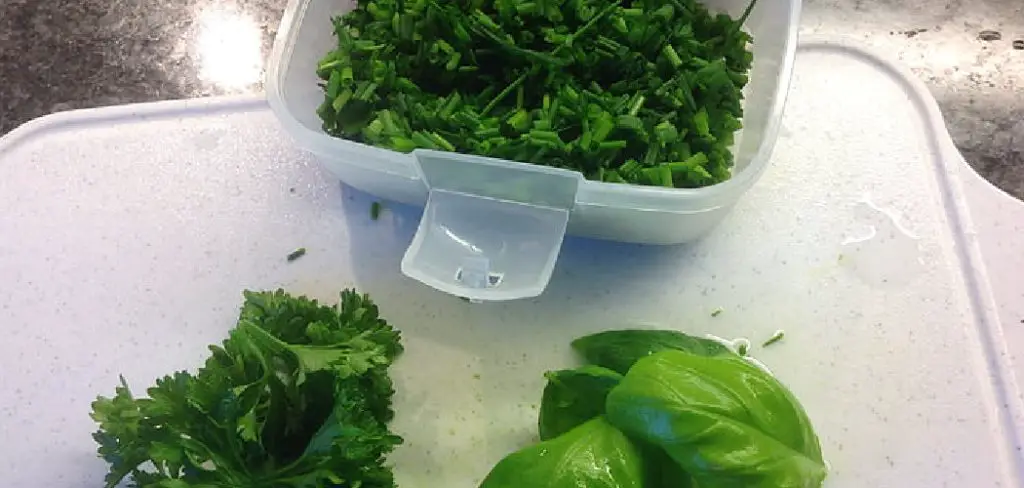
Can You Freeze Parsley and Basil?
Have you ever found yourself with an abundance of fresh parsley and basil but realized you can’t use it all before it goes bad? Don’t let it go to waste! Freezing parsley and basil is a great way to extend its life and have it on hand for future recipes. The process is simple and easy. Wash and dry your herbs, chop them, and place them in freezer bags.
You can either leave them loose or freeze them in ice cube trays with water or olive oil for easy portioning later on. When you’re ready to use your frozen herbs, add them to your dish as you would with fresh herbs. Give freezing a try and enjoy fresh herbs all year round!
Why Should You Freeze Parsley and Basil?
When it comes to cooking, herbs are essential for adding flavor and depth to your dishes. Parsley and basil are no exception, but it can be frustrating when they go bad before you can use them. Freezing parsley and basil is an excellent solution to this problem.
It retains their freshness and flavor and makes them easily accessible for adding to soups, stews, sauces, and any other dish you desire. By freezing these herbs, you can save time and money and reduce waste. Make the most out of your herbs by freezing them and always having them on hand whenever inspiration in the kitchen strikes!
Understanding the Characteristics of Parsley and Basil
Before diving into the freezing process, it’s important to grasp a basic understanding of our two herbs: parsley and basil. This will help in appreciating their unique flavors and nutritional benefits, as well as understanding why freezing is a beneficial storage method due to their perishable nature.
A. Overview of Parsley
- Varieties and flavors – Parsley commonly comes in two varieties: curly leaf and flat leaf, also known as Italian parsley. Curly leaf parsley has a mild flavor, while Italian parsley is more robust and is often favored in dishes for its flavor.
- Nutritional benefits – Parsley is a nutritional powerhouse. It’s packed with vitamins A, C, and K and also contains folate and iron. In addition to its nutritional value, parsley has been shown to have anti-inflammatory properties.
B. Overview of Basil
- Varieties and flavors – Basil also offers a variety of flavors with its different types. Sweet basil is the most common variety with a strong, peppery flavor. Thai basil has a licorice flavor, while lemon basil, as the name suggests, has a lemony flavor.
- Nutritional benefits – Basil is not just full of flavor, but it’s also full of nutrients. It contains vitamins A, C, and K, along with calcium, iron, and magnesium. It’s particularly known for its antioxidant and anti-inflammatory properties.
C. Discussion on the Perishable Nature of Fresh Herbs
Fresh herbs like parsley and basil are both wonderful and frustrating for the same reason: their freshness. While this quality makes them a delicious addition to meals, it also makes them highly perishable. They tend to wilt and lose their vibrant color and flavor within a week, even when refrigerated, which can lead to significant waste. This is where freezing can play a crucial role in preserving their freshness and reducing waste.
The Comprehensive Guide on How to Freeze Parsley and Basil
Section 1: Preparing the Herbs for Freezing
Before freezing, it’s important to prep the herbs to ensure they last longer and retain their freshness. To prepare parsley and basil for freezing, wash them in cold water and pat them dry gently. Chop the herbs into small pieces and set them aside. If you want to freeze them as whole leaves instead of chopped up, you can do that too.
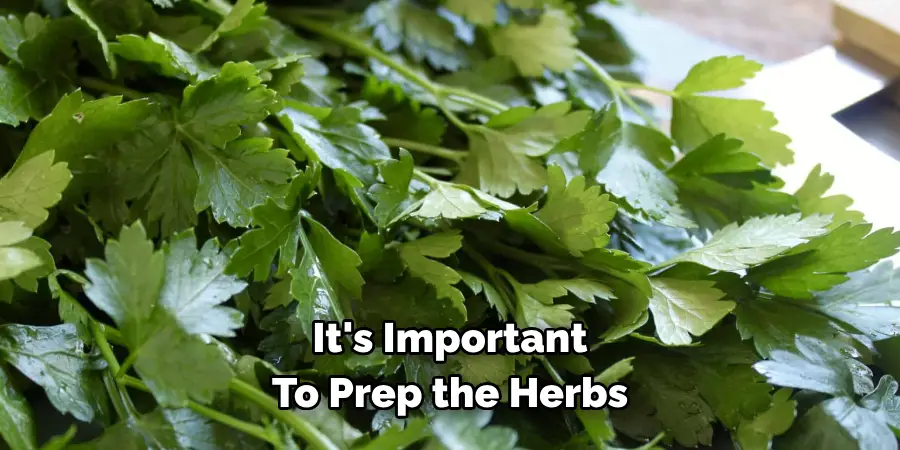
Section 2: Freezing Parsley and Basil
There are two ways to freeze parsley and basil: water or oil. Let’s explore both options.
Freezing Parsley and Basil with Water: Place the chopped or whole leaves into a ziplock bag and fill the bag with enough water to cover the herbs. Take out as much air as possible and seal the bag. Place the bag in the freezer and freeze it for 3-4 hours. Once the herbs are frozen, take out the bag and break off the required amount of herbs. You can hammer or roll the bag on the counter to break the ice. Refreeze the remaining herbs promptly.
Freezing Parsley and Basil with Oil: In this method, we use oil to freeze parsley and basil. Place the chopped or whole leaves in an ice cube tray and fill each cube with oil to cover the herbs. Place the tray in the freezer for 3-4 hours. Once the herbs are frozen, remove the tray and transfer the cubes to a ziplock bag. Refreeze the remaining cubes promptly.
Section 3: Storing Frozen Parsley and Basil
Once frozen, parsley and basil will last for up to six months. Store parsley and basil in an airtight container or ziplock bag to prevent freezer burn. If you’re freezing the herbs with oil, use a container with a tight-fitting lid instead of a bag to avoid oil spillage. Always label your frozen herbs with the date for easy tracking.
Section 4: Using Frozen Parsley and Basil
Using frozen parsley and basil is easy. All you have to do is take out the required amount of herbs from the freezer, thaw it for a few minutes, and use it in your dish. Alternatively, you can use the herbs directly from the freezer without thawing. A few things to remember while using frozen herbs are – to use them promptly after thawing, add them near the end of the cooking process, and adjust seasoning accordingly, as frozen herbs tend to be saltier.
Section 5: Thawing Frozen Parsley and Basil
The best way to thaw frozen parsley and basil is by placing the required herbs in a bowl of cold water for 15-20 minutes. You can also place them in the refrigerator overnight or leave them at room temperature for 1-2 hours. If you don’t have time, you can use the herbs directly from the freezer without thawing.
How to Use Frozen Parsley and Basil
If you’ve ever bought a bunch of fresh herbs only to have them wilt in the fridge before you even get a chance to use them, frozen herbs might be your new best friend. Parsley and basil are two herbs that can be difficult to keep fresh, but they also freeze very well. To use frozen parsley and basil, remove a portion from the freezer and let it thaw for a few minutes.
Then chop and add it to your recipe just as you would with fresh herbs. The best part? You don’t need to remove the leaves from the stems before freezing – throw the whole bunch in a resealable bag and stash it away in the freezer for whenever you need a little flavor in your cooking.
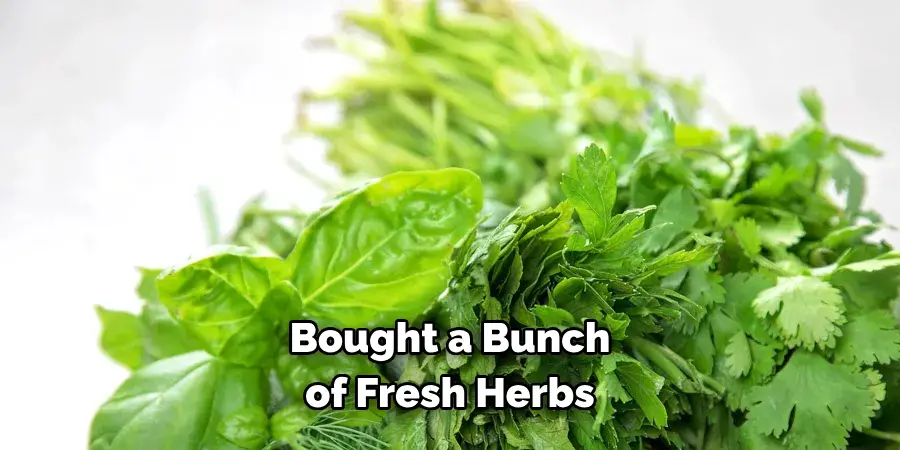
5 Considerations Things When You Need to Freeze Parsley and Basil
1. Quality of Herbs
When freezing parsley and basil, it is important to consider the quality of the herbs. Fresh herbs free from wilting or discoloration will freeze better than older or damaged herbs. Additionally, use only organic herbs, as they will have more flavor and nutrients than conventional varieties.
2. Preparation
Proper preparation is key when freezing parsley and basil. Make sure to wash the herbs thoroughly before chopping them into small pieces. This will help to remove all dirt and debris which can affect the flavor and texture of the frozen herbs. Additionally, pat dry the herbs with a paper towel before freezing them, as moisture can cause freezer burn.
3. Storage Containers
Another consideration when freezing parsley and basil is what type of storage containers you should use. Glass jars or plastic bags are both good options for storing frozen herbs as they are airtight and will help prevent freezer burn. If using plastic bags, make sure to squeeze out any excess air before sealing them shut so that there is no extra space for air in the bag.
4. Freezing Time
It is also important to consider how long you should freeze your parsley and basil in order to preserve their flavor and texture. Generally speaking, it is best to freeze the herbs for no more than two months in order to maintain their freshness and nutritional value. After two months, the flavor and texture of the frozen herbs may start to degrade due to oxidation caused by exposure to air or light over time.
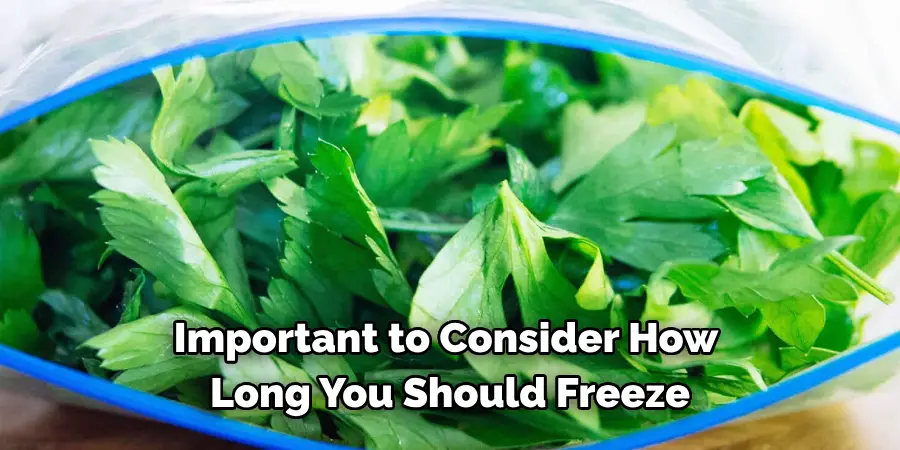
5. Usage
Finally, you should consider how you plan on using your frozen parsley and basil once thawed out before freezing them, as this will determine how much seasoning you should add while prepping them for storage to enhance their flavor after being thawed out later on down the line. For example, plan on using them mainly as a garnish. Adding some salt may be enough, whereas if you plan on using them mainly in sauces, then adding some garlic powder or other seasonings may be necessary for them to taste good once thawed out later on down the line.
By considering these considerations, you can ensure that your frozen parsley and basil will be flavorful and nutritious the next time you need them!
Benefits of Freeze Parsley and Basil
Are you tired of buying fresh herbs only to have them wilt and spoil in just a few days? Freeze parsley and basil, and say goodbye to that problem forever! Not only does freezing these herbs allow you to preserve their fresh flavor for a longer period of time, but it also adds convenience to your cooking routine.
No more last-minute trips to the store or settling for a subpar seasoning. Having frozen parsley and basil readily available in your freezer allows you to add fresh flavor to any dish anytime. Plus, you’ll save money by not constantly having to repurchase fresh herbs. Give it a try and taste the difference in your cooking!
Some Common Mistakes People Make When Trying to Freeze Parsley and Basil
Many people love having fresh herbs on hand, but sometimes, it can be hard to keep them from going to waste. Freezing parsley and basil is a great way to preserve these beautiful herbs for future use, but there are several mistakes that people often make when trying to freeze them.
Some of these mistakes include not washing and drying the herbs thoroughly, using too many pieces, and not labeling the bags or containers properly. These mistakes can result in herbs that are freezer-burnt, flavorless, or difficult to use. With a little extra care and attention, it is possible to freeze parsley and basil perfectly every time!
Enhancing Flavors with The Perfect Combination of Frozen Parsley and Basil, Paired with Complementary Ingredients
Frozen parsley and basil can greatly enhance the flavor profile of various dishes. These herbs pair exceptionally well with a number of ingredients.
Tomatoes:
Tomatoes and basil are a classic pairing, often found in Italian cuisine. The sweet, tangy flavor of tomatoes beautifully complements the slightly peppery flavor of basil. Adding a sprinkle of frozen parsley to this duo can add a fresh, earthy flavor that rounds out the dish.
Garlic:
Garlic, basil, and parsley make a flavorful trio that’s perfect for seasoning meats or creating a robust sauce—Garlic’s strong, aromatic flavor balances nicely with the sweet and earthy tones of basil and parsley.
Lemon:
Lemon’s zesty and tangy flavor profile pairs well with both parsley and basil. This combination is perfect for creating light and refreshing dishes. The brightness of lemon can elevate the flavors of these herbs, adding a citrusy twist to your dishes.
Cheese:
Cheeses, particularly those like mozzarella, feta, and parmesan, pair wonderfully with parsley and basil. The creaminess and saltiness of the cheese are a great contrast to the fresh and slightly sweet flavors of these herbs.
Olive Oil:
Olive oil acts as a perfect base for these herbs, helping to distribute their flavors evenly throughout the dish. Whether you’re making a marinade, a dressing, or a sauce, combining olive oil with frozen parsley and basil can add a depth of flavor to your culinary creations.
Remember, the key to a successful dish is balancing flavors. Be sure to experiment with different combinations to discover your personal favorites.
How to Properly Defrost Frozen Parsley and Basil
Step 1: Remove from the Freezer
Remove the container of frozen parsley and basil from the freezer when you need to use it.
Step 2: Thaw in Cold Water
Place the frozen herbs in a bowl of cold water for 15-20 minutes. This will defrost them quickly and keep them fresh.
Step 3: Drain Excess Water
Once thawed, drain any excess water from the herbs by patting them dry with a paper towel.
Step 4: Use as Desired
Now that they are thawed and dried, you can use your parsley and basil just as you would fresh herbs. Add them to soups, sauces, salads, or garnish your favorite dishes with them. Enjoy!
Step 5: Refreeze Leftovers
If you have any leftover thawed herbs, make sure to refreeze them immediately to maintain their freshness. Follow the steps above for proper storage and freezing techniques.
By following these simple steps, you can easily defrost your frozen parsley and basil without compromising their flavor or texture.
Health Benefits of Parsley and Basil
Parsley and basil are not just flavorful herbs, and they also offer a variety of health benefits. Parsley is a rich source of vitamin C and vitamin K, both essential for maintaining a healthy immune system and aiding in blood clotting, respectively.
Basil, on the other hand, is known for its anti-inflammatory properties, thanks to the compound eugenol present in it. Both herbs also contain essential minerals, such as iron, calcium, and potassium, which can contribute towards maintaining healthy bones and a robust cardiovascular system.
Furthermore, these herbs are beneficial for digestion. The fiber content in parsley aids in gut health by promoting regular bowel movements, while the eugenol in basil can help reduce the effects of gastric acidity.
Hence, adding these herbs to your diet is an easy way to incorporate more nutrients into your meals that not only enhance flavor but also promote overall health.
Sustainable Practices in Herb Freezing
1. Reducing Food Waste by Freezing Excess Herbs
One of the most significant advantages of freezing herbs like parsley and basil is that it helps to reduce food waste. Often, fresh herbs are sold in large bundles, and if you can’t use them up before they wilt, they end up in the bin. By freezing your excess herbs, you can extend their shelf life by several months, allowing you to use them as needed and minimizing waste.
2. Growing and Freezing Herbs at Home to Minimize Environmental Impact
Another sustainable practice is growing your own herbs at home. This not only ensures you have a fresh supply of herbs at your fingertips, but it also reduces the environmental impact associated with transporting herbs from the farm to the store. Once harvested, you can freeze these herbs to maintain their freshness, creating a sustainable cycle of growth and preservation.
3. Choosing Eco-Friendly Packaging for Frozen Herbs
The type of packaging you use for your frozen herbs also plays a role in sustainability. Opt for reusable containers or bags to store your frozen herbs. This can significantly reduce waste compared to using single-use plastic bags. Also, consider using BPA-free containers to ensure your food stays safe from harmful chemicals. By choosing eco-friendly packaging, you’re not only preserving your herbs but also contributing to a healthier planet.
Comparing the Flavor and Texture of Fresh vs Frozen Herbs
1. Flavor
Fresh herbs undoubtedly offer the most robust, bright flavor, with frozen herbs coming in a close second. However, when cooking with frozen herbs, it is essential to adjust the amount used as some flavors can intensify during the freezing process.
2. Texture
The texture of fresh and frozen herbs varies significantly. Frozen herbs tend to have a slightly softer texture due to the freezing and thawing processes, while fresh herbs are crisp and firm.
3. Incorporating Both Fresh and Frozen Herbs
Using a combination of fresh and frozen herbs is the best way to achieve the perfect balance of flavor and texture in dishes. Add fresh herbs at the end of cooking for a burst of freshness, while frozen herbs can be added earlier in the cooking process to ensure they have enough time to thaw and release their flavors.
Community and Cultural Perspectives on Freezing Herbs
Freezing herbs is a practice appreciated by communities and cultures worldwide, with each offering unique perspectives on its value. In regions such as Italy and Greece, where herbs are central to the culinary culture, freezing is revered as a method to extend the availability of fresh flavor year-round. In the fast-paced urban societies of the United States and Europe, freezing herbs is appreciated for the convenience it provides, enabling busy individuals to maintain a semblance of fresh, home-cooked meals despite their hectic schedules.
In many traditional societies, such as those in Asia and Africa, the practice of freezing herbs is a relatively new concept due to the historically limited access to refrigeration. However, with increasing urbanization and advancements in technology, it has started to gain popularity. In these cultures, freezing herbs serves as a bridge between culinary tradition and modern convenience, allowing them to preserve and utilize their native herbs in ways previously unattainable.
Lastly, eco-conscious communities globally advocate for freezing herbs as a means to reduce food waste. It enables the full utilization of purchased herbs, preventing unnecessary waste from spoilage, and is a small but effective step towards more sustainable kitchen practices.
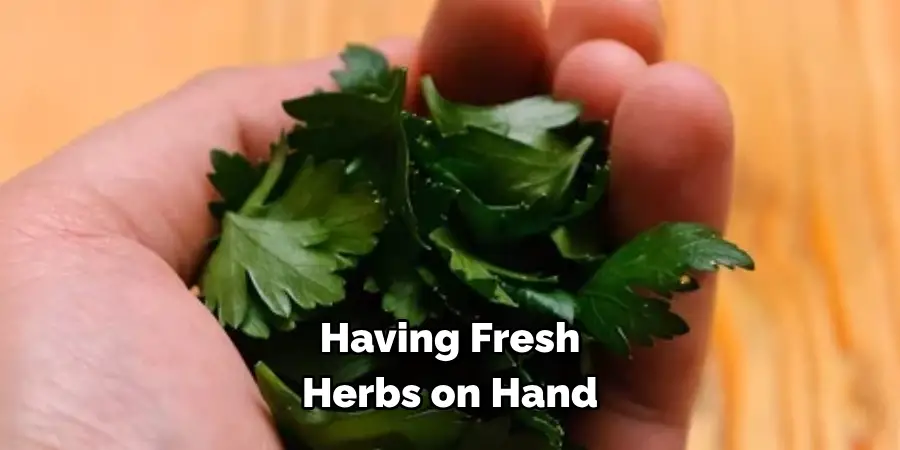
Conclusion
We hope this comprehensive guide has helped you learn how to freeze parsley and basil effectively. Freezing herbs is a great way to save money and reduce food waste while ensuring you always have fresh herbs.
Remember to prep your herbs before freezing, use water or oil to freeze them, store them properly, and use them sparingly when you cook. Thanks for reading our post about how to freeze parsley and basil.

